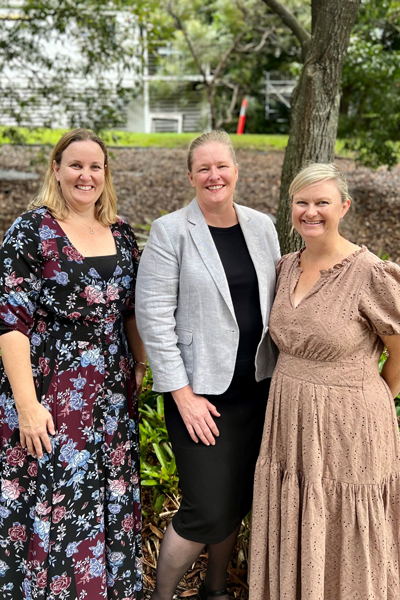- Foreword
- Message from Board Chair & Chief Executive
- 2023 Clinical Research Fellowships
- A message from the RBWH Foundation
- A message from The Common Good
- Metro North Research Excellence Awards
- Research stories
- ICU of the Future
- New approach ruling out pulmonary embolism
- Improving access to healthcare in the prison environment
- Safety and efficacy of peripheral versus centrally administered vasopressor infusion
- COVID-19 learnings set to inform future policy
- Telomere study could provide key to treating debilitating lung disease
- Productive Ward – Releasing time to care
- Brain organoids to revolutionise epilepsy treatment
- Reducing weight stigma in maternity care
- Parkinson’s Disease Check-In program giving people a voice
- Trial brings new treatment for common heart condition
- Teledentistry study shows promise in residential aged care
- Research fellow to boost Oral Health evidence-based care
- Study explores best approach to surgery for painful shoulder osteoarthritis
- The development and pilot testing of a stroke telerehabilitation decision toolkit
- Metro North Health delivers world-first breast scaffold surgery
- Regenerative jawbone hard at work care of collaborative Metro North Health approach
- Jamieson Trauma Institute leads e-scooter and e-bike injury research to drive community safety
- Forgotten fathers in pregnancy and obstetrics
- Putting the Spotlight on nursing and midwifery research
- Improving the health self-efficacy of stroke survivors
Reducing weight stigma in maternity care

From left to right, University of Queensland Research Fellow Dr Bec Jenkinson, Metro North Conjoint Associate Professor Lauren Kearney and RBWH Director of Research, Women’s and Newborns Professor Leonie Callaway
Researchers at the Royal Brisbane and Women’s Hospital (RBWH) are working to make maternity care a safe place for all women, irrespective of their body size.
Weight stigma, fat shaming, and discrimination on the basis of body size and shape in maternity care is rarely spoken about, but for many women, it is an unacceptable reality.
Approximately 50 per cent of women of reproductive age in Australia live in larger bodies, with a further 50 per cent experiencing postpartum weight retention. This means that more than 3.3 million Australian women are vulnerable to weight stigma and discrimination across the preconception to postpartum periods.
RBWH Director of Research, Women’s and Newborns, Professor Leonie Callaway said following ongoing feedback from healthcare consumers highlighting the issue, she engaged with Metro North Conjoint Associate Professor Lauren Kearney and University of Queensland Research Fellow Dr Bec Jenkinson to conduct further research into the topic.
“Weight stigma or discriminating on the basis of body size and shape is the last form of discrimination that appears to be acceptable in healthcare,” Professor Callaway said.
“We are very conscious of the need to avoid discrimination based on gender, sex, sexual orientation, race, and religion. However, every day, women in our maternity services are experiencing discrimination, stigma and shame, based on their body size and shape. Like all discrimination, this needs to stop.
“Additionally, there is compelling evidence that outside of pregnancy, weight stigma is associated with reluctance to seek health care, and poorer health outcomes.
“It is possible that many of the poor health outcomes experienced by larger bodied women are explained by weight stigma and discrimination, rather than body size.”
As part of the research, the team engaged with nine consumers – women who had given birth within the past 18 months and who felt that their weight had influenced the maternity care they received. The group included women Aboriginal and Torres Strait Islander women, LGBTQI+ consumers, and culturally and linguistically diverse women from metropolitan and regional/rural areas in Queensland, Victoria and New South Wales.
Maternity consumers Renee, Sara and Ahlia are three of the nine consumers consulted during the research. They said during pregnancy women are particularly vulnerable and sharing their stories was a healing experience.
“Women with larger bodies are extra vulnerable, dealing with the stigma that goes along with that,” Renee said.
University of Queensland Research Fellow Dr Bec Jenkinson said through their consumer engagement, they were able to develop the Body Positive Birth project plan, shaping language choices and the design of the project. They are also in the final stages of literature reviews on the topic.
“Several of these women agreed to form our Lived Experience Expert group and have gone on to contribute to numerous related projects including co-designing video stories to raise awareness of weight stigma amongst antenatal clinicians, participating in a formal research priority setting activity and contributing to an article for Health Translation Queensland,” Dr Jenkinson said.
“While involving consumers requires the investment of time to build genuine relationships and a willingness to be flexible and openminded, it has already delivered enormous benefits for our project.
“Consumer input led us to focus on education and capacity building amongst healthcare professionals, as a new approach to improving the health outcomes and experiences of larger bodied pregnant women.”
